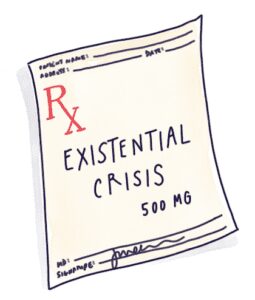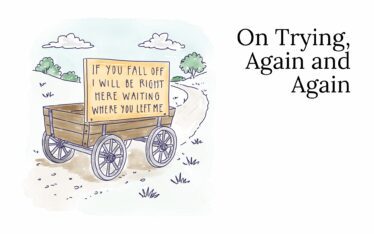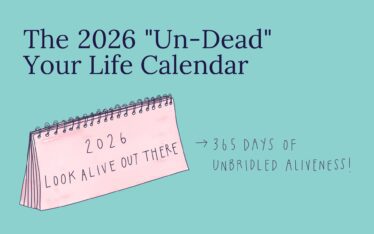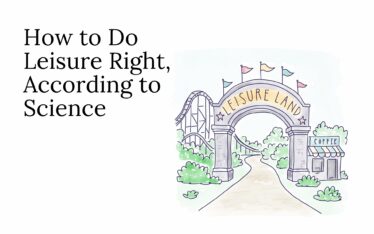One of my biggest goals in life (right up there with convincing the candy executives to sell an all-red bag of Skittles) is to push you to the brink of an existential crisis.
You’ll notice I said “brink”; I’m not an animal.
Just like in the mobster movies when they dangle the guy off the roof by his feet, I’ll pull you back up off the edge of the building with dramatic flair (I’ll need help because I’m really quite weak), right before you fall to your death enter full-on crisis mode.
I don’t want you to need a lifetime of therapy, I just want you to wake up to the absurdity of your finite human condition and to live like you mean it in the midst of said absurdity.
The best way I’ve found to egg this along—to live astonishingly albeit temporarily—is to dance around the edges of an existential crisis. Flirt with it, if you will, but don’t take it home (and if you must take it home, well, don’t let it spend the night).
Fortunately life does a decent job of serving up crisis-making material, so let’s talk about how to embrace the gifts that existential wake-up calls have to offer.
Grenzsituations (a.k.a.: boundary situations)
Karl Jaspers, the 19th century existential philosopher and psychiatrist, believed that being alive is about finding ourselves in situations. We’re pretty much hopping from one situation to another—sometimes gleefully, sometimes ruefully, sometimes inebriatedly, sometimes gracefully, sometimes sloppily.
Some situations are relatively trivial in the grand scheme of our lives (e.g.: buttering the toast, completing the TPS reports), whereas some situations have the capacity to rock our world (e.g.: turning 50, becoming an empty nester).
Jaspers noted that our highest degree of self-awareness—of becoming the most authentic versions of ourselves—arises from “Grenzsituations” . . . what are known as “boundary situations.” These are the meatier moments when we are exposed to the boundaries of our existence.
World-rocking boundary situations arise from struggle, suffering, change, guilt, and last but not least in this rollicking line-up . . . death. (Yes! You are right, you psychology buffs: this is similar to Victor Frankl’s “tragic triad” of suffering, guilt, and death—super shitty but inevitable life situations we can ultimately derive meaning from.)
Awakenings to life
Psychologists tell us that an existential crisis (or its tamer cousin, the midlife crisis) can occur because of a confrontation with mortality that’s propelled by a boundary situation—a more urgent scenario that either hints gently at our impermanence, or boldly thrusts death to front and center stage. Examples include:
- Birthdays that end with zeros
- Milestone anniversaries
- Job loss
- Retirement
- Significant illness
- Commitments to or separations from key relationships (marriage, divorce, etc.)
- Relocations
- Deaths of loved/ liked ones
- Going gray (for us vain folks in the group)
What’s the deal with the birthday blues?
Despite the prevalence of cake, not everyone is delighted by their annual reminder of being born.
Researchers note that for many people, “birthdays may be reminders of past disappointments, broken promises, personal losses, feelings of dependency, anxiety concerning the fulfillment of personal needs, and the awareness of their mortality.” Sounds like a really fabulous party. Please don’t invite me.
(And don’t even get me started on the studies that show famous people are more likely to die on or after their birthdays than would be expected by chance. I want to talk about it here but it’ll open up a can of research-laden worms I’ll have to save for another post. Oh, the suspense!)
Dealing with the dilemmas of living
For some of us, boundary situations have the power to create fundamental shifts in the way we live our lives; they are often seen as opportunities that lead us to our “gate of full existence” (so says Dr. Joel Vos). Don’t we want to walk through that gate, even if the price of admission requires a wee dose of the tragic triad?
Some patients in therapy report feeling like their existence cannot be postponed after experiencing a boundary situation—prioritizing a mindful way of living that savors the present moment instead of a “someday I’ll” approach to living later. Many a tale has been told by therapists of terminally ill patients who have found meaning and growth after coming face to face with death, for example, wistful for not knowing what they know now then.
Researchers also point out that life-changing events can trigger a desire to find meaning in life. This can translate into the contemplation of and creation of legacy: passing on parts of ourselves to future generations (like memoirs, photo books, advice, and all sorts of organs.)
So now what?
Your boundary situations can either grab you by the throat and choke you to (figurative) death, or shake you by your shoulders to Make Something of the Rest of Your Existence.
Judgment Alert! “Making Something” of your life doesn’t mean you need to start a non-profit that betters third world countries (although a tip of the hat to you if that’s your bag). No, living your life with intention and purpose and vim and vigor is very much subjective and only you know what it takes to light your life flame.
Let’s celebrate the boundaries of your being (every big birthday, every big milestone, every big beginning and ending)—even if these situations feel disconcerting at first. Let’s embrace the wake-up call for the gift that it usually is (albeit in disguise): an opportunity to come to terms with the facts of life, and to live wider and deeper.
Quick example: About one week before I turned 40 my eyes decided they had had enough of living a 20/20 life. They refused to see things clearly up close, which sparked my most mini of miniature existential crises: I was forced to wake up to that fact that my body was going to continue to fail me (because it was designed to perish; a total engineering flaw, I know, but true nonetheless). I saw the light (but not up close, hahahaha): I was aging, I was going to die, I needed to make the most of my remaining days, and what kind of cool eyeglass frames could I get?
If you don’t have a turning point on your near-term horizon (damn it! No divorce or retirement or bankruptcy planned this year?), that doesn’t mean you have to sit around and wait for a boundary situation to rear its ugly head. Whisk yourself away for a personal retreat and visualize your next significant birthday or anniversary. What feelings of gain and loss will you likely experience? Reflect on your retirement, even if it’s decades away. How do you want to feel as you culminate your professional career? What kind of legacy do you want to leave behind you in your dust? Think, write, read what you wrote, write about what you thought about what you just wrote, and then repeat that all over again.
 Don’t shy away from what feels like existential dread as you navigate your way through these boundary situations. Researchers are clear that “consciousness of the inevitable presence of death can give us courage and integrity; it gives us an authentic perspective on the things that matter most.” WE WANT WHAT MATTERS MOST, RIGHT?
Don’t shy away from what feels like existential dread as you navigate your way through these boundary situations. Researchers are clear that “consciousness of the inevitable presence of death can give us courage and integrity; it gives us an authentic perspective on the things that matter most.” WE WANT WHAT MATTERS MOST, RIGHT?
It would be lovely if we were wired to accept our temporary existence with equanimity. But no. We thrash and push and plug our noses and deny the truth because it sure ain’t pretty (and that’s what a good bottle of wine is for, right—to drown out the voice that says, “my time is ticking … is this all there is?”). If it takes a jostling situation to rouse you out of your slumbering existence, I’d sign you up for that jostle any day of the week. If it takes an existential slap in the face to help you wake up to the kind of life you long to be living—but aren’t because you’re deluding yourself into believing “there’s still time to get to Fiji”—I’ll wind up to give you that good (loving) slap. (Or maybe I’ll hang you off the roof of a building by your feet for a minute or two—with the help of a burly guy named Bruno—to snap you to attention and make your remaining Mondays meaningful and majestic.)

P.S.: You, me, Instagram. Why aren’t we connected yet?
P.P.S.: Oh and just in case you missed it… I’d love you forever if you took 16 minutes out of your life to watch my TEDx talk!






